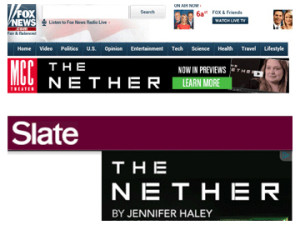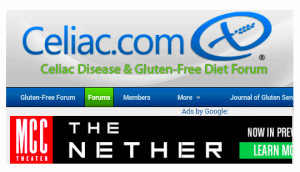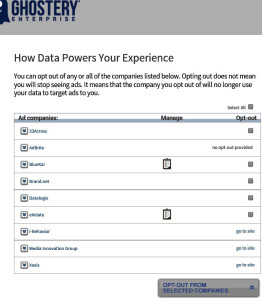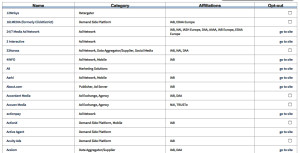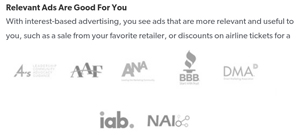At first, I thought it was just a coincidence that the banner ad on CNN.com was for the same off-Broadway show to which I had just bought tickets.
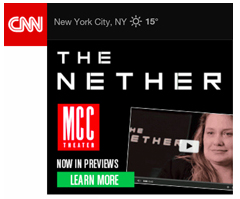
Only after that same ad (for a show called The Nether) also popped up when I was on The New York Times site did it occur to me that maybe this wasn’t coincidence. Maybe this ad was targeting me, I thought, because I had bought my tickets for this show online.

I’d seen targeted ads similar to this repeated on multiple sites before. But this one was different. It was tied to a much more specific behavior of mine than the others and promoted something relatively obscure—a limited-run show in a small theater. (Note: I have no connection with this show or anyone associated with it). Over the next few days, as the ad made its way to other sites that I visited, I found myself resenting its constant presence. I felt stalked. It seemed to be following me everywhere I went online. Even across the Atlantic Ocean.
It was as if I had embarked on a road trip and the same blasted roadside billboard had kept appearing no matter which street I drove down. It was also a constant irritant for another reason: It became a visual reminder of just how widely online advertising networks stealthily monitor our every activity.
(Psssst, advertisers: Yes, I was quite interested in the show itself—enough, in fact, to have bought tickets to it. Yet having this ad trail me around the web still gave me the creeps.)
Within days I found the ad showing up on more sites than I’d ever seen any ad inhabit. It popped up at both a conservative site (Fox News) and a more liberal one (Slate).
So far, these sites were pretty general purpose. What about special interest sites? I surfed over to Bicycling.com and voila! There it was, the Zelig of banner ads.
What about a site devoted to a subject that’s personally sensitive, such as a health condition? On to Celiac.com I went and, yup, it followed me there, too. Did the advertising networks who already knew my tastes in theater also know and track which illnesses or health issues I was interested in? The advertising industry says it doesn’t serve up ads based on health information, but what behavioral health information does it store (and possibly share with insurers or government agencies)?
Opting out…sort of
Eventually, I explored my options for booting this ad—and its advertising network pals—out of my life. In other words, I tried to opt out.
 I clicked on the “i” icon in the ad’s upper right corner for AdChoices.
I clicked on the “i” icon in the ad’s upper right corner for AdChoices.
Soon a screen appeared with a list of nine advertising networks. It was not clear why these particular nine were shown. To add to my confusion, only five offered the option to opt out by checking a little box. Three others required a visit to their sites before an opt out might be possible. One network was labeled, “no opt out provided.”
“If these are my AdChoices,” I thought, “they suck.”
Maybe I had other choices. To find out, I went to some of my other favorite sites and, when Zelig appeared, examined my AdChoices again. At one site, AdChoices informed me that I could opt out from Yahoo’s advertising network. At another, the relevant advertising network was Google’s.
Finally, I hit upon a jackpot: an opt-out list of more than 600 services, part of which is shown below.
It was fascinating to learn that so many enterprises were collecting data about consumers online. And not all of them were ad networks. Some were, for example, a Demand Side Platform, Data Aggregator, Social Media, or Retargeter. Who knew? And how the heck would I know which to opt out of and which not?
To complicate things further, it turns out there are at least two separate industry associations to which these data collectors belong (The Network Advertising Initiative and Digital Advertising Alliance), each of which offers its own opt-out page on its own site.
Well, at least I could opt out from all 600 of them right on this screen with just a couple of mouse clicks, right? Nope. Many of the services—like maybe hundreds—make you go to their web site to opt out. That sounded like a fun way to spend a Saturday, but somehow I wasn’t biting.
Advertisers refuse to listen
Why on earth must you, the consumer, contend with this Frankenstein-ian system of controls just to stop advertisers from using your own behavior to target you with ads—a practice the industry euphemistically calls interest-based advertising?
It’s a simple question. Here’s a simple answer: The advertising industry doesn’t care what you want.
As I explained in an earlier report for StateoftheNet.Net, the advertising industry’s claim that consumers want such behaviorally-targeted ads was destroyed once and for all last spring when a nationally representative survey by Consumer Reports (a survey that I helped design) found the following:
* 76 percent of consumers place little or no value on so-called “interest-based” ads
* A whopping 85 percent are unwilling to trade their personal data, even anonymously, in return for being able to view such ads.
It can argue otherwise until it’s blue in the face, but the advertising industry is blatantly ignoring the will of the American public by continuing to target consumers with behavioral advertising without their prior permission.
Here’s how desperate the advertising industry is to convince you to accept targeted advertising. I found this sales pitch from online marketer Conversant Media: “Relevant Ads Are Good for You.” Really? Earth to Madison Avenue: When you have to sell your service as if you’re trying to get a child to eat their broccoli, you’re doing something very wrong.
In the meantime, if you do want to opt out from behavioral advertising, check out the Network Advertising Initiative and Digital Advertising Alliance opt-out pages. Don’t assume that doing so will stop all such advertising, because as of when I wrote this report it didn’t yet apply to some of tracking technologies other than cookies that are used to target consumers online. And it may only opt you out for a few years. And you have to opt out separately for each web browser and device you use. But it’s a start.
Don’t believe that an online ad can really stalk a flesh-and-blood human being? Consider this insight, ironically drawn from that Zelig of off-Broadway shows, The Nether: “Just because it’s virtual…doesn’t mean it isn’t real.”
–Jeff Fox




